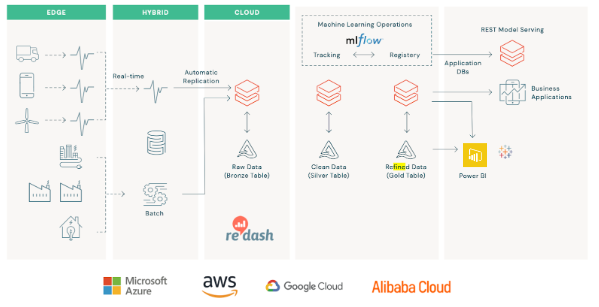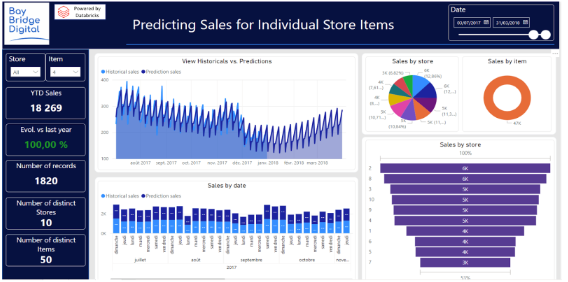
BaybridgeDigital has unveiled a strategic collaboration with Databricks, a unified data analytics platform, to enhance our capabilities in data analytics and artificial intelligence (AI). Databricks offers a cloud-native platform enabling enterprises to develop, scale, and oversee data and AI initiatives, encompassing various machine learning models and generative AI (LLM). Through this partnership, organizations can effortlessly integrate Data Cloud data with external data through the Databricks Lakehouse Platform, ensuring optimal data security and governance.
Despite the surge in AI adoption, a staggering 41% of IT leaders lament that their data remains too complex or inaccessible to extract meaningful value from it, contrasting with the 80% who recognize AI's potential to unlock significant value from their data, which serves as the lifeblood of modern business operations.
Databricks stands as a robust data analytics platform engineered to empower organizations in unlocking the full potential of their data. With seamless integration with various data sources and tools, Databricks enables organizations to seamlessly integrate it into their existing data ecosystem, fostering data-driven decision-making and fostering innovation throughout the enterprise.
Databricks offers a scalable and user-friendly environment tailored for data engineering, data science, and business analytics endeavors. With an eye towards streamlining data processing at scale, Databricks facilitates advanced analytics such as machine learning and deep learning, alongside automated infrastructure management and stringent security measures.

The Databricks platform offers a suite of use cases, from Data Warehousing to Business Intelligence. It also allows for the integration with major cloud platforms such as AWS, Microsoft Azure or Google Cloud. We will take a look at a few applications of the Databricks lake house as well as the Databricks AI functionalities.
One of its main selling points is the Databricks data lake house. It offers a Unity Catalog which adds a unified governance model so that you can secure and audit data access and provide lineage information on downstream tables.

In a lake house architecture, data modeling aligns with business requirements, serving end users with analytics and reports like a traditional data warehouse setup. However, it diverges by preventing data silos and redundant copies which ensures data cleanliness. Constructing a data warehouse within the lakehouse framework consolidates all data into one system, leveraging features like the Unity Catalog and Delta Lake.
Unity Catalog facilitates unified governance, ensuring secure and audited data access with lineage information. Meanwhile, Delta Lake enhances data reliability, scalability, and quality through ACID transactions and schema evolution, providing robust tools for maintaining data integrity within the lakehouse environment.

In the medaillon architecture, the Bronze layer stores raw data before conversion into Delta tables. It enables efficient Change Data Capture, provides a historical data archive, and supports data lineage and auditability.
In the Silver layer of the lakehouse, data from the Bronze layer undergoes matching, merging, conformance, and cleansing processes to ensure that the Silver layer presents an "Enterprise view" of essential business entities, concepts, and transactions. This includes consolidating master customers, stores, non-duplicated transactions, and cross-reference tables for comprehensive insights.
The Gold layer is usually structured into "project-specific" databases ready for consumption. This layer is primarily designated for reporting purposes, employing denormalized and read-optimized data models with reduced joins. This layer serves as the ultimate presentation stage for projects like Customer Analytics, Inventory Analytics, Customer Segmentation, Product Recommendations, and Marketing/Sales Analytics.
Databricks leverages generative AI alongside the data lakehouse to comprehend the distinctive semantics of your data. Subsequently, it autonomously enhances performance and administers infrastructure to align with your business requirements.
Through natural language processing, Databricks familiarizes itself with client specific terminology, enabling the user to explore and access data by posing questions in everyday language. This natural language assistance aids in coding, error resolution, and accessing documentation.
Moreover, Databricks ensures robust governance and security for your data and AI applications. You can seamlessly integrate APIs like OpenAI allowing you to deploy your private LLM. Therefore, you don’t compromise your data privacy or intellectual property control.
By integrating a Customer Data Platform (CDP) within the Databricks Lakehouse, retailers can seamlessly merge customer data from diverse sources, including online interactions, in-store purchases, and loyalty programs.
This consolidation of customer data facilitates a comprehensive and accurate understanding of each customer. Through unified data management, retailers can break down data silos and harness advanced analytics to glean deeper insights into customer behavior, preferences, and lifetime value.
This customer-centric approach enables retailers to deliver personalized experiences, provide relevant product recommendations, and optimize marketing campaigns. Ultimately, this integration drives increased customer engagement and fosters loyalty, leading to enhanced business outcomes and sustainable growth.
The integration will facilitate seamless data access for AI model training without the need for ETL processes, thereby maximizing the company's investment in AI. It offers instant access to consolidated customer data, simplifying the model development process and improving the accuracy and efficiency of AI predictions and insights. With this capability, customers can create, train, and refine their AI models within Databricks Machine Learning, and seamlessly integrate them into Data Cloud.
Use cases of Databricks being used are for retail use cases and utilizing predictive analytics. The two key use cases that can be identified are “On-shelf availability” and “Fine grained demand forecasting”
The On-Shelf Availability use case is particularly important in the retail industry . Globally, retailers are forfeiting nearly $1 trillion in sales due to the absence of desired items in their stores. Shoppers encounter out-of-stock situations as frequently as one in three shopping trips, resulting in significant losses. According to industry research firm IHL, worldwide, shoppers face $984 billion worth of out-of-stocks, with North America accounting for $144.9 billion alone.
Databricks assumes a pivotal role in supporting on-shelf availability for retailers by furnishing real-time insights into inventory levels and supply chain data. The platform facilitates in-depth analysis of product-specific data, enabling retailers to promptly identify and rectify potential stock-outs or imbalances. Leveraging Databricks' scalability and performance, retailers can efficiently process vast volumes of data from diverse sources.
This optimization empowers them to fine-tune inventory management strategies and ensure products are readily accessible to fulfill customer demands. This data is utilized to notify retail personnel, distributors, brokers, and consumer goods companies. Each day, tens of thousands of individuals worldwide perform tasks generated by these algorithms.

The second use case is Fine-Grained Demand Forecasting, to be able to best predict sales demand. Databricks empowers retailers to develop precise and detailed demand forecasts by analyzing historical sales data, customer behavior, and external factors such as weather and market trends.
Through its advanced analytics and machine learning capabilities, the platform enables retailers to build predictive models that anticipate demand at a granular level, such as individual products or store locations. This enables retailers to make informed decisions regarding inventory, production, and supply chain planning, ultimately leading to reduced stockouts, optimized inventory levels, and heightened customer satisfaction. The Baybridgedigital team worked closely on this use case and developed a Power BI dashboard to clearly highlight these predictions.
BayBridgeDigital provides skilled and certified Data Engineers and Data Scientists in Databricks to support your company's Data Cloud deployment. Our certified experts specialize in Databricks and are prepared to assist you in initiating your data pipeline implementation..
As an authorized partner of Databricks, our devoted team is dedicated to crafting customized solutions that improve efficiency and drive your digital transformation journey. Through the seamless integration of Databricks with Data Cloud, we harness the potential of data analytics to facilitate informed decision-making to derive value.
What is the Databricks solution and how can it help my company?
The Databricks solution covers a range of applications, covering Business Intelligence to Data Warehousing, and seamlessly integrates with leading cloud platforms like AWS, Azure, and Google Cloud. This platform offers numerous benefits for your company, including enhanced data analysis, streamlined operations, and access to advanced AI functionalities.
What are the main expertise that BayBridgeDigital offers?
BaybridgeDigital offers certified databricks professionals that are able to help your company with their Databricks implementation. Being an accredited Databricks Partner, our team focuses on planning, strategizing, and designing customized Salesforce and Databricks solutions to elevate productivity and enrich digital engagements.
What are the main benefits of AI with Databricks?
Databricks utilizes AI to optimize data comprehension and performance within its data lakehouse framework. The availability of Natural language processing also enables easy interaction with the data using everyday language, streamlining tasks like coding and documentation access. Lastly, the robust governance and security measures ensure data and AI applications are safeguarded, such as OpenAI.
https://docs.databricks.com/en/getting-started/concepts.html
https://www.linkedin.com/pulse/nrfs-big-show-what-i-experienced-databricks-worlds-biggest-gates/
https://www.databricks.com/resources/ebook/big-book-of-retail-consumer-goods-use-cases
https://www.salesforce.com/news/stories/salesforce-databricks-data-ai-news/
https://docs.databricks.com/en/sql/index.html
Ebook: Big Book of Retail & Consumer Goods Use Cases